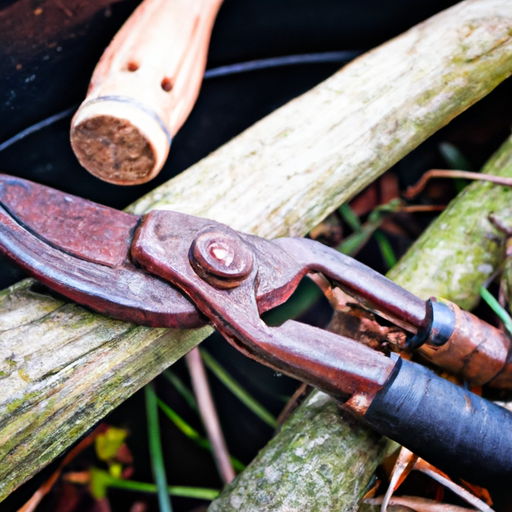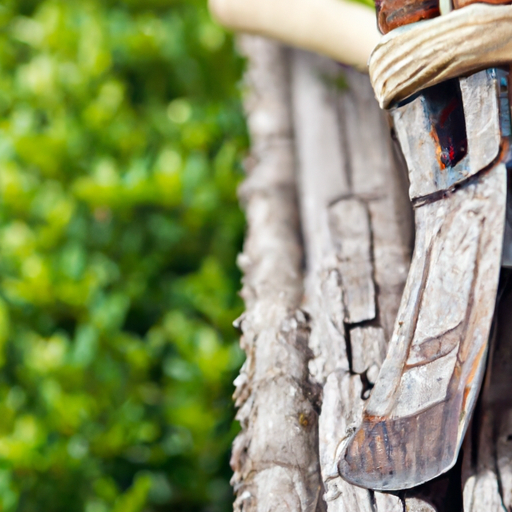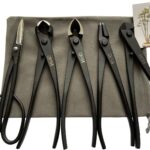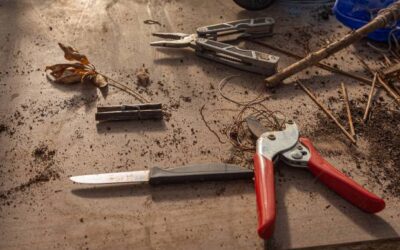In this article, you will learn about the importance of regularly maintaining your Japanese garden tools. Taking care of your tools is essential to ensure their longevity and effectiveness in maintaining your garden. By regularly cleaning, sharpening, and oiling your tools, you can prevent rust and keep them in top condition for years to come.
Regular maintenance of your Japanese garden tools is crucial for several reasons. Firstly, keeping them clean and free from rust will help to prevent damage to your plants and soil. Rusty tools can transfer diseases and fungi to your plants, leading to poor growth and even death. Secondly, by sharpening your tools regularly, you can ensure that they are always ready for use and can perform their tasks effectively. Dull tools can be frustrating to use and can result in uneven cuts and damage to your plants. Finally, oiling your tools after use can help to prevent rust and maintain their smooth operation. By lubricating the various moving parts of your tools, you can prolong their lifespan and make them easier to use.
Why Regular Maintenance is Essential
Maintaining your Japanese garden tools is crucial for several reasons. Regular maintenance enhances the performance of your tools, prolongs their lifespan, and prevents damage and deterioration. By taking the time to care for your tools properly, you can ensure they continue to serve you well for many years to come.
Enhances the Performance of Tools
Regular maintenance is essential for maintaining the performance of your Japanese garden tools. Over time, dirt, debris, and rust can accumulate on the blades and other parts of your tools, causing them to become less effective. By regularly cleaning and lubricating your tools, you can ensure they remain sharp and efficient.
Prolongs Tool Lifespan
Proper maintenance also helps to prolong the lifespan of your Japanese garden tools. By regularly cleaning, sharpening, and replacing worn parts, you can prevent your tools from deteriorating and breaking down. This not only saves you money in the long run but also ensures that you can continue to enjoy using your tools for many years.
Prevents Damage and Deterioration
Regular maintenance is crucial for preventing damage and deterioration to your Japanese garden tools. By cleaning and storing your tools properly, you can protect them from rust, moisture, and other elements that can cause them to corrode. Additionally, by sharpening the blades and replacing worn parts when necessary, you can prevent further damage and ensure that your tools are always in good working condition.
Tools Require Different Maintenance Techniques
Different Japanese garden tools require different maintenance techniques. Here are some tips on how to properly maintain three common tools: pruning shears, bonsai scissors, and hori hori knives.
Pruning Shears Maintenance
Pruning shears are essential for maintaining the health and appearance of your plants. To properly maintain pruning shears, start by cleaning and lubricating the blades. Remove any dirt or debris, and then apply a small amount of oil to the blades to keep them moving smoothly. In addition, regularly sharpen the blades to ensure precise cuts and replace any worn parts to maintain optimal performance.
Bonsai Scissors Maintenance
Bonsai scissors are delicate tools used for precise pruning in bonsai gardening. To maintain bonsai scissors, start by cleaning and disinfecting them after each use to prevent the spread of disease. Next, apply a protective oil to the blades to prevent rust and ensure smooth cutting. Finally, regularly check and adjust the screws to ensure the scissors are properly tightened for safe and efficient use.
Hori Hori Knife Maintenance
Hori hori knives are versatile multi-purpose tools commonly used in Japanese gardening. To maintain a hori hori knife, start by cleaning and drying the blade thoroughly after each use. This helps prevent rust and keeps the blade in good condition. Additionally, regularly sharpen the blade to maintain its cutting edge and store the knife in a dry place to prevent damage.

The Role of Proper Storage
Proper storage is essential for maintaining the condition of your Japanese garden tools. Here are some tips on how to store your tools properly.
Keeping Tools in a Dry Area
Japanese garden tools are often made of metal and wood, which can both be damaged by moisture. To prevent rust and deterioration, store your tools in a dry area, such as a shed or garage. Avoid storing them outside or in damp places to ensure they remain in good condition.
Using Protective Cases or Pouches
Protective cases or pouches can help protect your Japanese garden tools from damage during storage and transportation. Consider investing in cases or pouches designed specifically for your tools to provide additional protection and keep them organized.
Organizing and Labeling Tools
Keeping your tools organized and labeled makes it easier to find and access them when needed. Consider using a tool rack or toolbox to store your tools in a neat and organized manner. Label each tool so you can quickly identify and locate the one you need.
Frequency of Maintenance
To ensure the longevity and optimal performance of your Japanese garden tools, it’s important to establish a regular maintenance routine. Here are some suggested maintenance schedules for different types of maintenance.
Routine Maintenance Schedule
Perform routine maintenance tasks such as cleaning, lubricating, and checking for any signs of damage or wear after each use. This helps to keep your tools in good condition and ensures they are always ready for use.
Post-Use Maintenance
After each use, clean your tools to remove any dirt or debris. Check for any signs of damage or wear and address them accordingly. Properly store your tools in a dry area to prevent any moisture-related damage.
Seasonal Maintenance
Perform more extensive maintenance tasks on your tools at least once a year, preferably before the start of the gardening season. This may include sharpening blades, replacing worn parts, and applying protective coatings. Seasonal maintenance helps to ensure the longevity and optimal performance of your tools throughout the year.

Benefits of Regular Maintenance
Regular maintenance of your Japanese garden tools offers several benefits that can greatly enhance your gardening experience.
Easier and More Efficient Gardening
Maintained tools perform better and require less effort to use. Sharp and well-maintained blades cut through plants more easily, making gardening tasks more efficient and enjoyable.
Reduced Risk of Accidents or Breakage
Regularly maintained tools are less likely to malfunction or break, reducing the risk of accidents during use. By addressing any damage or wear promptly, you can ensure that your tools are safe to use and minimize the risk of injury.
Preserving the Beauty and Tradition of Japanese Gardening
Japanese gardening is known for its attention to detail and aesthetic beauty. By regularly maintaining your tools, you help to preserve the artistry and tradition of Japanese gardening. Well-maintained tools not only perform better but also contribute to the overall beauty of your garden.
DIY vs. Professional Maintenance
Deciding whether to maintain your Japanese garden tools yourself or seek professional help depends on your skills, knowledge, and preferences.
Evaluating Personal Skills and Knowledge
If you have experience and knowledge in tool maintenance, you may feel confident in performing the necessary maintenance tasks yourself. However, if you are unsure or lack experience, it may be wiser to seek professional help to avoid causing damage to your tools.
When to Seek Professional Help
If your tools require extensive repairs or if you are unsure about the appropriate maintenance techniques, it is best to seek the help of a professional. Professional garden tool maintenance services have the skills, equipment, and knowledge to properly care for your tools and ensure their longevity.
Cost Considerations
The cost of DIY maintenance versus professional maintenance should also be taken into account. While performing maintenance yourself may save money in the short term, professional maintenance can save you money in the long run by ensuring that your tools are properly maintained and have a longer lifespan.
Conclusion
Regular maintenance is essential for the long-lasting and high-performance of your Japanese garden tools. By following the appropriate maintenance techniques for each tool, storing them properly, and establishing a regular maintenance routine, you can prolong the lifespan of your tools and ensure they continue to serve you well. Additionally, regular maintenance offers benefits such as easier and more efficient gardening, reduced risk of accidents or breakage, and the preservation of the beauty and tradition of Japanese gardening. Whether you choose to perform maintenance yourself or seek professional help, the key is to prioritize the care and maintenance of your tools. With regular maintenance, you can enjoy the beauty and tranquility of your Japanese garden for years to come.








